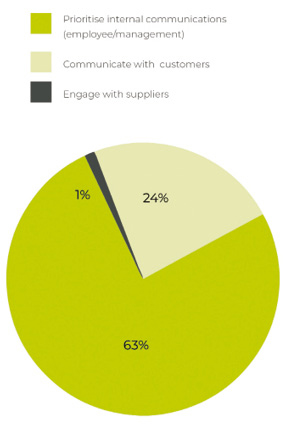SECTION 3: COMMUNICATION
Communication is fundamental to achieving sustainability goals, particularly in facilities management. Our research shows there is heavy reliance on effective communication for sustainability efforts, but there are differences in approach and focus.
- 63 per cent prioritise internal communications (employees/management),
- 19 per cent communicate with customers,
- Only 1 per cent engage with suppliers.
External communication around sustainability is crucial for building strong supply chains and enhancing business relationships with customers, ultimately elevating brand value. Yet, alarmingly, our survey reveals that only one per cent of respondents currently engage with their suppliers on sustainability issues. This highlights a significant gap in proactive collaboration on sustainability throughout their value chain. As discussed regarding Scope emissions, it is important to open channels of communication with the supply chain to lead the industry toward true sustainability. By fostering open dialogue with suppliers, you can drive meaningful change, align sustainability efforts, and better meet the growing expectations of environmentally conscious clients.
To start being proactive, FMs should initiate conversations with suppliers about their environmental impact. Starting points include:
- Asking suppliers about their sustainability mission and objectives.
- Verifying their claims through certifications or Science-Based Targets.
- Understanding whether the supplier tracks the full lifecycle of their products.
- Discussing how the supplier can support FM services in achieving better sustainability goals.
SUMMARY
Our survey shows that many FMs are primarily driven by sustainability legislation, focusing on internal targets like Scope 1 and 2 emissions and plastic waste reduction. While this is a positive step, a broader approach—particularly addressing Scope 3 emissions is essential to achieve genuine sustainability. Scope 3, which accounts for over 70 per cent of an organisation’s carbon footprint, is often overlooked despite its significant impact.
Cost remains a key challenge, especially for SMEs, as sustainable products often come with a higher “eco-premium”. However, the long-term benefits, such as operational efficiencies and savings, should not be ignored.
Another crucial factor is communication. FMs tend to focus on internal sustainability messaging but lack a proactive strategy to engage suppliers and stakeholders. Clear communication of sustainability goals across the supply chain is vital for aligning efforts and driving real progress.
Though progress has been made, a more proactive, comprehensive, and collaborative approach to sustainability is needed.
For a deeper dive into FM sustainability trends and actionable advice, download your free copy of our full report https://biologicalpreparations.com/sustainability-fm-report.






